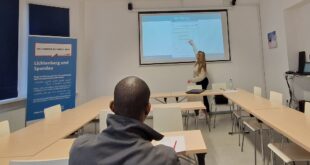The Federal Office for Migration and Refugees (BAMF) is not allowed to analyse the mobile phones of asylum-seekers without a concrete reason. This practice is inadmissible if other available findings and documents are not sufficiently taken into account, the Federal Administrative Court ruled in Leipzig on Thursday.
For years, the BAMF, which is the central migration authority in Germany responsible for registration, integration and repatriation of refugees, has been analysing the mobile phone data of asylum-seekers without any reason. Now the Federal Administrative Court has ruled the practice is disproportionate and therefore illegal.
The five federal judges thus rejected the BAMF’s appeal against a ruling of the Berlin Administrative Court of June 2021 and confirmed the Berlin ruling. The evaluation of digital data carriers to determine the identity and nationality of a foreigner is only permissible if the purpose of the measure cannot be achieved by milder, less intrusive means, the judges explained.
In the case in question, Suraya S., an Afghan woman born in 1977, had entered the Federal Republic of Germany in 2019 and applied for asylum in Berlin in May 2019. The BAMF had ordered the woman to provide the authorities with the access data of her mobile phone and the device itself. The mobile phone was connected to a computer. The data from the mobile phone was transferred to a computer and analysed. In August 2019, the BAMF rejected the woman’s asylum application. In May 2020, S. filed a complaint with the Berlin Administrative Court.
Keller cited the Tazkira (an Afghan identity document without biometric features), the marriage certificate, register comparisons and an enquiry with the language mediator about linguistic anomalies as examples of less severe means that would have been available to the BaAMF in S.’s case.
The Gesellschaft für Freiheitsrechte e.V. (GFF) welcomed the decision of the federal judges. “The ruling is a great success for data protection and the privacy of refugees,” said lawyer Lea Beckmann from GFF. This practice must stop now, she said. The measurable benefit was small anyway. On the other hand, there is the intrusion into the privacy of those affected, she added.
Sola Jolaoso
 THE AFRICAN COURIER. Reporting Africa and its Diaspora! The African Courier is an international magazine published in Germany to report on Africa and the Diaspora African experience. The first issue of the bimonthly magazine appeared on the newsstands on 15 February 1998. The African Courier is a communication forum for European-African political, economic and cultural exchanges, and a voice for Africa in Europe.
THE AFRICAN COURIER. Reporting Africa and its Diaspora! The African Courier is an international magazine published in Germany to report on Africa and the Diaspora African experience. The first issue of the bimonthly magazine appeared on the newsstands on 15 February 1998. The African Courier is a communication forum for European-African political, economic and cultural exchanges, and a voice for Africa in Europe.





















